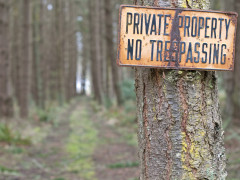I have been posting for three months now on St. Thomas Aquinas’s view of private property and Paradise. For reasons I don’t quite understand, I enjoy reading what this thirteenth century critical figure in the Catholic Church has to say. But I have these nagging questions running around in my mind that keep asking: “Why does it matter?” “Am I wasting my time?” “Wouldn’t my time be better spent doing something else?” “Who cares anyway?”
So I figured I should at least try to write about that question too, in case someone, or anyone, should happen to bump into my posts and wonder the same thing. I have to confess up front that I haven’t really worked out a clear, defensible answer, though I have various thoughts, not all consistent, running through my head on the topic at any given time.
If I were Catholic, I suppose, the question would potentially be easier to answer. I could appeal to Catholicism and the importance of Aquinas in the history of the Church. But I am not Catholic, nor Christian even, and so I don’t have that reason to appeal to. In fact, if anything, anymore, my roots are in the Jewish tradition, and I was trained as a rabbi originally, though I have not been practicing or identified in any sustained way for many years. So why am I reading Aquinas? I suppose I could appeal to the fact that Aquinas was an important thinker, who put together the great synthesis between Christianity and Aristotle. But even so, who cares anymore about that?
One possible answer is that studying Aquinas is my form of golf. Many of my colleagues play golf on a regular basis. They are totally consumed by it. And while I can understand how hitting a ball competitively, socializing with friends, being outdoors and getting exercise, can be fun and even fulfilling in many different ways, I simply never had a deep interest in golf. I suppose there could be a deeper more transcendent meaning of playing golf too, though most players, I believe, would be content to say they play simply because they enjoy it.
I have thought about whether similar reasons explain why I wake up each morning and delve into the complex texts of Aquinas and other topics that sometimes seem so distant and obscure to my friends. Why would you be studying that? Maybe the activity is simply my form of golf, a kind of fun and it doesn’t need much more explanation or justification that that. Those like myself who love pondering a complex text can understand what I mean. There is always something opaque and deep about a complex thinker, that makes their ideas both intriguing and mystifying. The act of reading and interpreting of such texts is like trying to find one’s way out of the woods or solving a challenging puzzle. Complex texts are intriguing, tantalizing, even mysterious, and one feels great success at mastering them, like hitting a hole in one, or putting the last piece of a puzzle in place. So perhaps I should be content with that answer. Aquinas is nothing more but also nothing less than my form of golf.
And yet, I hope and sometimes think, that my activity amounts to more than that. Sometimes when I am optimistic, or naïve, depending on your perspective, I think that my delving into Aquinas’s views on private property might matter. I think about how rarely in our contemporary society we think about where our ideas come from and how vehemently we defend them, without understanding their past or their histories.
The notion of private property is one such idea that has intrigued me for a while.[1]It was also a central theme in my recent book, Beyond Liberty Alone It sits somehow at the center of so many debates that we have today, about taxes, the role of government, what’s fair and just and how to address inequality. That’s why I write, I tell myself, because just maybe there are others out there who are curious and pondering those ideas too and who may have their own doubts about the self-evidence of the proposition that private property is my right. Perhaps they are doing a search on the Internet for private property rights and bumping into my posts. Perhaps they stop, read a little and think, “I didn’t know that.” That’s my hole in one. Or perhaps a better analogy is dropping a pebble into the pond and hoping that some of ripples will touch someone else. It may not be anyone I know, or even when I am alive, but perhaps my questions, if not my answers, touch someone else. Perhaps.
But perhaps this alternative answer is all the hubris and the deceit of the ego. It is a question that anyone who ponders the meaning of their life might ask. Am I doing something meaningful? How do I know? I have my doubts sometimes that delving into Aquinas’s thinking matters in some way deeper than playing golf. And thus I do other things now, such as working with the homeless, and trying to help people move off the streets into living situations. That activity seems to be self-evidently good and valuable in a way that I’m not sure the study of Aquinas is.
And yet still I hold out hope that the hours I put into writing and posting can matter. Someone else might find interesting that Aquinas thought private property originated from sin. That was something I didn’t know when I started studying his Summa Thelogicæ. It is certainly an idea that challenges the unquestioned assumptions today that private property is a natural right, to be defended at all costs, and the very purpose of our government. We forget that the ideas that we take for granted as true today were not always self-evident. And thus, I study for those who agree, and think that the history of our ideas matter, and who believe that the unquestioned orthodoxies of our day, can one day be challenged.
References
| ↑1 | It was also a central theme in my recent book, Beyond Liberty Alone |
|---|




